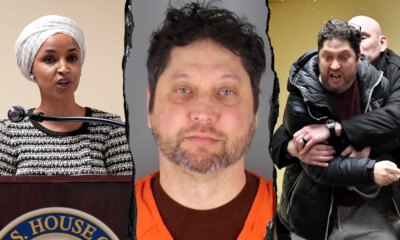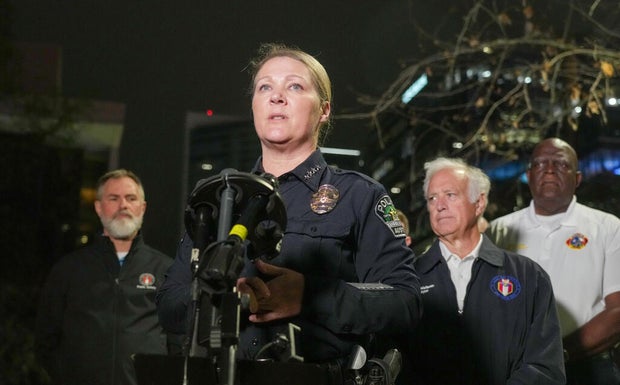News
Zuckerberg dines with Trump in Mar-a-Lago

FORT LAUDERDALE, Fla. — Donald Trump dined on Wednesday with Meta CEO Mark Zuckerberg at the president-elect’s Mar-a-Lago club in Florida, bringing together the Facebook founder and the former president who was once banned from that social network.
Stephen Miller, who has been appointed deputy chief of staff for Trump’s second term, said Zuckerberg, like other business leaders, wants to support Trump’s economic plans. The tech CEO has been seeking to change his company’s perception on the right following a rocky relationship with Trump.
“Mark, obviously, he has his own interest, and he has his own company and he has his own agenda,” Miller said in an interview on Fox News about the meeting. “But he’s made clear that he wants to support the national renewal of America under Trump’s leadership.”
A spokesperson for Meta confirmed that Zuckerberg and Trump met on Wednesday, saying he was invited for dinner with the president-elect and other members of his team to talk about the incoming administration.
Trump was kicked off Facebook following the Jan. 6, 2021 attack on the U.S. Capitol. The company restored his account in early 2023.
During the 2024 campaign, Zuckerberg did not endorse a candidate for president.
Zuckerberg has since taken a more positive stance toward Trump. Earlier this year, he praised Trump’s response to his first assassination attempt, calling it “badass.” Zuckerberg also complained that senior Biden administration officials pressured Facebook to “censor” some COVID-19 content during the pandemic.
Still, Trump in recent months had continued to attack Zuckerberg publicly. In July, he posted a message on his own social network Truth Social threatening to send election fraudsters to prison in part by citing a nickname he used for the Meta CEO. “ZUCKERBUCKS, be careful!” Trump wrote.
The Thanksgiving eve visit also comes as tech mogul Elon Musk has become more influential in Trump’s Make America Great Again movement, contributing an estimated $200 million through his political action committee to help elect Trump. Musk is the billionaire owner of the X social network, a competitor to Meta.
Musk has spent considerable time at Mar-a-Lago since the election, and Trump selected him to lead an outside advisory panel known as the “Department of Government Efficiency ” to identify waste with Vivek Ramaswamy, a venture capitalist and former GOP presidential candidate.

News
Video: What the Texas Primary Battle Means for the Midterms

new video loaded: What the Texas Primary Battle Means for the Midterms
By J. David Goodman, Alexandra Ostasiewicz, June Kim and Luke Piotrowski
March 1, 2026
News
Mass shooting at Austin, Texas bar leaves at least 3 dead, 14 wounded, authorities say

Gunfire rang out at a bar in Austin, Texas, early Sunday and at least three people were killed, the city’s police chief said.
Austin Police Chief Lisa Davis told reporters the shooter was killed by officers at the scene.
Fourteen others were hospitalized and three were in critical condition, Austin-Travis County EMS Chief Robert Luckritz said.
“We received a call at 1:39 a.m. and within 57 seconds, the first paramedics and officers were on scene actively treating the patients,” Luckritz said.
There was no initial word on the shooter’s identity or motive.
Davis noted how fortunate it was that there was a heavy police presence in Austin’s entertainment district at the time, enabling officers to respond quickly as bars were closing.
“Officers immediately transitioned … and were faced with the individual with a gun,” Davis said. “Three of our officers returned fire, killing the suspect.”
She called the shooting a “tragic, tragic” incident.
Austin Mayor Kirk Watson said his heart goes out to the victims, and he praised the swift response of first responders.
“They definitely saved lives,” he said.
Davis said federal law enforcement is aiding the investigation.
News
A long-buried recording and the Supreme Court of old (CT+) : Consider This from NPR

-

 World4 days ago
World4 days agoExclusive: DeepSeek withholds latest AI model from US chipmakers including Nvidia, sources say
-

 Massachusetts4 days ago
Massachusetts4 days agoMother and daughter injured in Taunton house explosion
-

 Montana1 week ago
Montana1 week ago2026 MHSA Montana Wrestling State Championship Brackets And Results – FloWrestling
-

 Denver, CO4 days ago
Denver, CO4 days ago10 acres charred, 5 injured in Thornton grass fire, evacuation orders lifted
-

 Louisiana6 days ago
Louisiana6 days agoWildfire near Gum Swamp Road in Livingston Parish now under control; more than 200 acres burned
-

 Technology1 week ago
Technology1 week agoYouTube TV billing scam emails are hitting inboxes
-

 Technology1 week ago
Technology1 week agoStellantis is in a crisis of its own making
-

 Politics1 week ago
Politics1 week agoOpenAI didn’t contact police despite employees flagging mass shooter’s concerning chatbot interactions: REPORT























